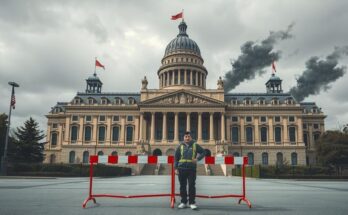In a striking episode on 12 February, Sevan Doraisamy and Azura Nasron, leading figures from the human rights organisation SUARAM, found themselves ensnared in a web of legal troubles. Their peaceful endeavour to engage the Ministry of Home Affairs (MOHA) in Putrajaya culminated in accusations of trespassing, with charges set to be brought against them in court on 25 February. Under the archaic Protected Areas and Protected Places Act 1959, they could face a grim sentence of up to two years in prison or hefty fines if convicted.
Such punitive measures against advocates for human rights echo a broader narrative of suppression. “Punishing human rights defenders with criminal charges for peacefully seeking dialogue with public officials is a clear attempt to intimidate and silence those who are holding the government accountable,” stated Nalini Elumalai of ARTICLE 19. This incident starkly highlights the precarious balance between state power and the fundamental rights of assembly and free expression, undermining Malaysia’s aspirations toward democratic governance.
After waiting over two hours for access to discuss critical human rights conditions under the Security Offences Act 2012, these activists found themselves confronted not with open dialogue, but with the heavy hand of the law. Nalini further articulated the need for public institutions to embrace the scrutiny they often dodge, adding: “Malaysia must end its reliance on outdated laws to suppress dissent.” Their struggle represents a poignant call for a society where civil dialogue flourishes and human rights defenders can advocate without caution.
As this legal battle looms, it serves as a reminder that the path to justice is often riddled with obstacles. The charges against SUARAM not only threaten individuals but embody a broader systemic issue where voices seeking accountability are stifled. The plea is clear: Malaysia must relinquish these outdated measures and support the freedom of its citizens to protest and express their rights without fear of retaliation.
Activists from SUARAM, Sevan Doraisamy and Azura Nasron, face trespassing charges for their peaceful attempt to engage with Malaysia’s Ministry of Home Affairs. They may endure up to two years of imprisonment under an outdated law. Human rights organisation ARTICLE 19 criticises these actions as an attempt to silence dissent and urges the Malaysian government to support free expression and advocacy efforts.
The impending legal charges against SUARAM activists highlight a troubling trend in Malaysia’s stance on human rights. Rather than fostering open dialogue, authorities resorted to intimidation tactics, revealing the fragility of civil liberties in the country. It is essential for Malaysia to reconsider its approach and ensure that individuals can advocate for human rights without repercussions, thus preserving the democratic spirit that underpins the nation’s constitution.
Original Source: www.article19.org



